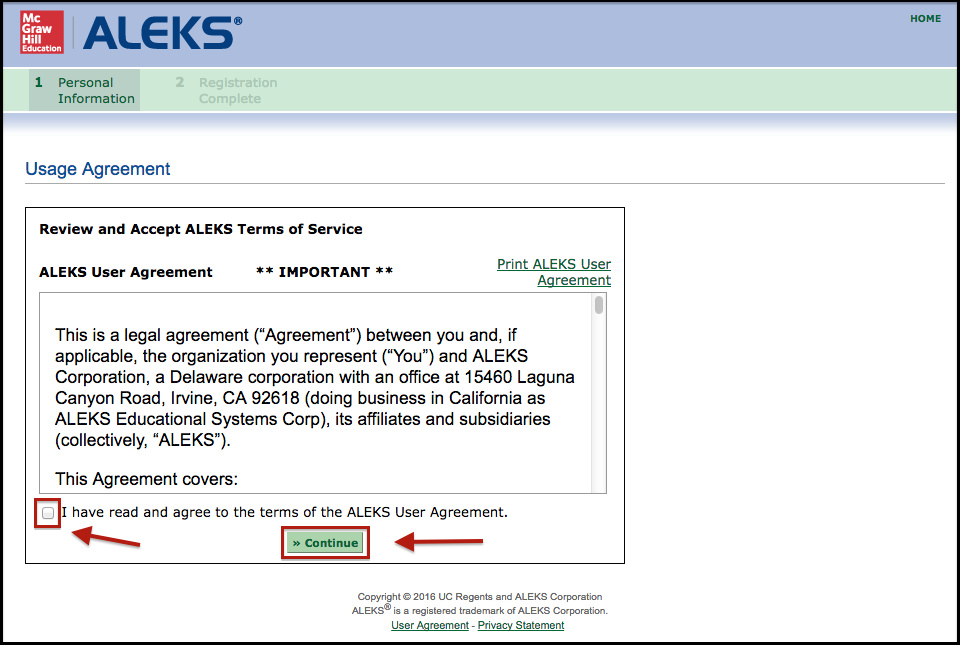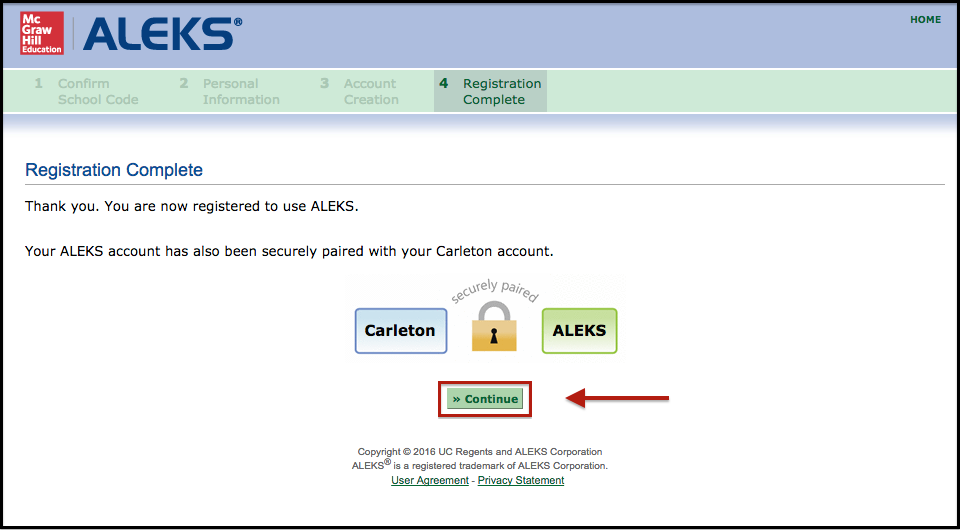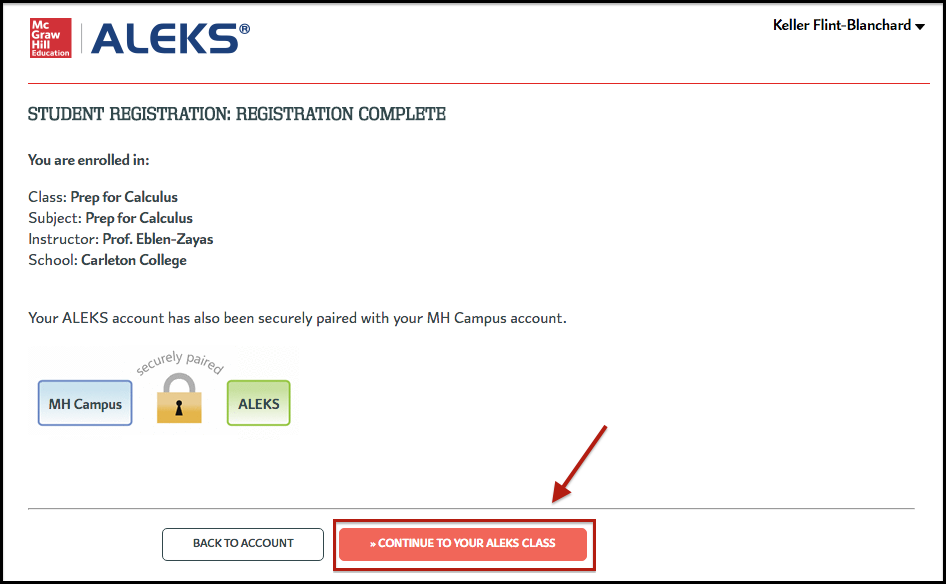Why don’t I have permission to access the application form?
This is an error that will occur if you are logged into a personal Gmail account. Here's how to fix it:
- Log out of your personal Gmail account.
- Navigate to docs.carleton.edu and log in using your Carleton username and password.
- Now click the application link again; you should have access!
How do I log in to the quantitative skills assessment (ALEKS) for the first time?
1. Go to go.carleton.edu/aleks where you will be prompted to log in with your Carleton username and password.
2. You will be brought to a screen asking you to accept the usage agreement. Read the terms, check the box indicating that you agree to the terms, and click continue.
 3. You will then be brought to a screen indicating that your registration is complete, and your ALEKS account has been successfully paired with your Carleton account. Click continue.
3. You will then be brought to a screen indicating that your registration is complete, and your ALEKS account has been successfully paired with your Carleton account. Click continue.
 4. The next screen confirms your student registration is complete in the CUBE class. You may click continue to your ALEKS class to begin.
4. The next screen confirms your student registration is complete in the CUBE class. You may click continue to your ALEKS class to begin.

 3. You will then be brought to a screen indicating that your registration is complete, and your ALEKS account has been successfully paired with your Carleton account. Click continue.
3. You will then be brought to a screen indicating that your registration is complete, and your ALEKS account has been successfully paired with your Carleton account. Click continue.
 4. The next screen confirms your student registration is complete in the CUBE class. You may click continue to your ALEKS class to begin.
4. The next screen confirms your student registration is complete in the CUBE class. You may click continue to your ALEKS class to begin.

When will I find out if I have been selected to participate in CUBE?
The application deadline is June 16th, and we will let students know by early July whether they have been selected to participate.
What are the advantages of participating in CUBE?
CUBE is a great way to connect with the Carleton community before you come to Northfield in September. It is a free opportunity to brush up on quantitative skills you may have forgotten or missed in high school, so you are more prepared to do college-level work. Finally, CUBE gives you the opportunity to earn credit that can help ensure timely progress towards graduation. Upon successful completion of the program, you can earn up to 6 credits.* That credit buffer is an advantage because it gives you flexibility in the future to take a lighter course load one term or study abroad, and still be on track to graduate on time.
*In rare cases, a student may already have earned the College maximum of 36 pre-matriculation credits from AP exams or college-in-high-school opportunities, in which case the student is not eligible to earn additional pre-matriculation credits from this program.
What is the cost to participate in CUBE?
There is no cost or fee to participate in this program other than your time of 10-12 hours/week in the summer and 2-3 hours/week in the first half of the fall.
What are the CUBE program expectations?
The CUBE program includes an online summer component and a face-to-face fall component.
During the summer, you are expected to engage with program activities for 10-12 hours/week from July 17th–August 25th. Scheduling is flexible: participants should expect to spend 2 hours/day working on their own and 1-3 hours of scheduled meetings each week.
You will earn 5 credits for your summer participation. During the fall, you are expected to register for IDSC 110 Thinking with Numbers, a 1-credit course that meets weekly for an hour for the first 5 weeks of the term. This comes to a total of 6 credit hours, equal to one normal Carleton course.
What are the technical requirements for CUBE?
As noted in the CUBE program expectations, the first portion of the program is an online component during the summer. Students must have reliable access to a computer with an internet connection. A student whose only access to the internet is via a mobile phone will not be able to fully engage in the activities of this program. All Carleton students are expected to bring a personal computer to campus (minimum recommended specifications), so Carleton provides a laptop stipend to students based on income eligibility requirements. If you qualify, you will receive an email from Adit Burkule with information about how to participate. In case of shipping delays, Carleton can provide a loaner laptop for the summer. Carleton also has a limited number of WiFi hotspots that students in the CUBE program can request to use at no charge if they do not have reliable access to high-speed internet.
What will I be doing in the online summer portion of the program?
Students will work in teams on several activities, including exploring Carleton-specific data sets and collaborating to solve the Problem of the Week. In addition, there will be opportunities for self-paced quantitative skills review and practice through online resources. Students will get to know each other through the CUBE group chat and daily prompts, talk with Carleton alums about their time at Carleton and how they are using quantitative skills in their careers, and meet with key faculty and staff from all over campus.
How does CUBE differ from other support programs that Carleton offers (e.g., FOCUS, TRIO)?
CUBE is a short-term program to support students in any field with the transition to college courses, while FOCUS and TRIO are programs that provide cohorts of students extended support over all four years at Carleton.
FOCUS is a program that supports incoming students with an interest in the natural sciences and includes 9 credits of coursework in the first two years. CUBE students cannot join FOCUS in the fall, but they can apply to the winter cohort.
TRIO is a federally-funded program to support students who are lower-income, first-generation, and/or have a documented disability by providing academic, financial, and social programming. There is no coursework required for TRIO, but there is an optional Argument & Inquiry (A&I) seminar dedicated to TRIO students. Students can participate in both TRIO and CUBE.
What should students who are thinking about math and science majors know about CUBE?
CUBE is designed for students with a broad range of interests. Although we will be drawing on examples from the social sciences and natural sciences, CUBE focuses on quantitative skills that all students need in order to be successful at Carleton, whether that's for their three required quantitative reasoning encounter (QRE) courses, or the Calculus sequence. If you are interested in STEM and feeling nervous about Introductory Calculus, let us know in your application so we can connect you to additional resources!
In addition to brushing up on quantitative skills, CUBE is a great opportunity to get to know other students in your incoming class. Students interested in the natural sciences (Astronomy, Biology, Chemistry, Computer Science, Geosciences, Mathematics, Physics, Statistics) might also be interested in the FOCUS program, described elsewhere on this page.
What should students who are thinking about social science, humanities, and arts majors know about CUBE?
CUBE is designed for students with a broad range of interests. Although we will be drawing on examples from the social sciences and natural sciences, CUBE focuses on quantitative skills that all students need in order to be successful at Carleton. At Carleton, every student must complete three courses that include a quantitative reasoning encounter (QRE) to graduate, and over 200 classes at Carleton are QRE courses - many in Social Sciences, Humanities, and Arts. These courses are focused on understanding what numbers, data, or statistics mean - numerical literacy - not advanced mathematics. If you are feeling nervous about your QRE courses, we strongly encourage you to apply for CUBE!
What quantitative skills topics are covered in CUBE?
The program focuses on skills that are usually covered in math and statistics courses up to and including Pre-Calculus. Many of these skills are ones that you may have already seen in a high school course, but you may not remember all of these skills well.
Skills will include evaluating and manipulating algebraic functions (linear, exponential, logarithmic), some geometry and trigonometry, graphing, and basic statistical analysis of data sets in Microsoft Excel. The program will review these quantitative skills by exploring how they are relevant in a wide range of disciplines.
Does the initial assessment for CUBE or CUBE participation affect my placement when I get to Carleton?
No. Don’t worry if you find yourself rusty on many of the topics! The initial assessment for CUBE will not be used for placement into any courses or be shared with your academic advisor or professors.
How do I apply to participate in CUBE?
The program application can be found on the main page, and the application deadline is June 16th. The application will ask you to answer several questions about your interests, and then you will be asked to complete a quantitative skills assessment using the ALEKS Prep for Calculus online platform. This initial assessment takes about an hour to complete.
Invitations to apply to CUBE are sent to students who seem likely to benefit most from the program, but any domestic incoming Carleton student can apply. CUBE has a maximum enrollment of 30 students. We may not be able to accommodate everyone who applies to participate.